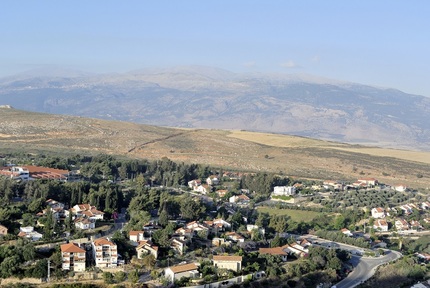On Lebanon, once again – Amos Harel in Haaretz:
‘Last Saturday's downing of three drones launched by Hezbollah, near Israel’s offshore Karish gas rig, was presented as an achievement by the defense establishment. On Wednesday the Israel Defense Forces reported, a week after the event, that Hezbollah had also launched a drone over the Mediterranean three days before the Saturday incident. Joint navy-air force-Military Intelligence work had enabled the interception of the unmanned aircraft. They weren’t carrying explosives, but the IDF was not ready to put a site of major economic importance at risk.’
(…)
‘Some security experts see the event as a turning point that requires a different approach. Brig. Gen. (res.) Udi Dekel, from the Institute for National Security Studies in Tel Aviv, wrote that Hezbollah’s move obligates Israel to reexamine what he calls its policy of restraint on its northern border. “Israel is being deterred. As long as it doesn’t respond, Hezbollah secretary general Hassan Nasrallah, with Iran’s support, will continue to stretch the rope. Sometimes it’s necessary to upset the apple cart in order to return to the previous rules of the game,” he maintains. Dekel recommends attacking air defense systems that Hezbollah operates in Lebanon, even if could risk a serious escalation.’
(…)
‘However, the Shi’ite organization also conveyed other messages. The Rai al-Youm news website claimed that Hezbollah had decided to go to war “to liberate the Lebanese gas and oil deposits from Israel’s control. Destroying the Karish gas rig will be a relatively simple matter.” The IDF refuses to be impressed by the new threats. The military perceives the dispute over the demarcation of the maritime border between Lebanon and Israel as an issue that the Beirut government is inflating for its own purposes. The Lebanese had already agreed to an American mediation proposal which marked the borderline as lying south of Israel’s opening position – and then retracted their agreement. A compromise will likely be reached. In any event, it’s clear to every outside observer that the Karish gas field is south of Lebanon's most extreme demands, and that the rig is not plundering resources from Israel’s neighbor.
According to this approach, Lebanon’s hostility to Israel, which has peaked in Hezbollah's actions, reflects a vast sense of frustration above all. The country is at its lowest ebb since the civil war in the mid-1970s. Across Lebanon, electricity and water are available for only a few hours a day – far below the average in the Gaza Strip, for example. The political paralysis and corruption in Lebanon are so tightly intertwined that even its neighbor to the south looks like a relatively well-ordered state.
While Israel is pushing ahead with its maritime gas project, with talks underway about exports to Europe to mitigate the energy crisis sparked by the Russian invasion of Ukraine, Lebanon hasn’t really begun searching for gas. Its efforts have been stymied by the lengthy and debilitating negotiations over the demarcation of the maritime border. But even if a compromise is reached, foreign firms will hesitate to enter into business with the shaky government in Beirut.
For years now, Hezbollah has been maneuvering between the need to pursue the struggle against Israel and the organization’s concern that it will be blamed for Lebanon’s economic and political deterioration. Its decision to send drones to Karish is being perceived as a public signal to both Israel and the Lebanese government; something of a reminder of the group's destructive capabilities. Perhaps there was an intention to expedite the negotiations.’
(…)
‘Lapid met on Wednesday with French President Emmanuel Marcon in Paris for a talk devoted in large part to Iran and Lebanon. Two years ago, in the wake of the colossal explosion in Beirut harbor, Macron arrived quickly on an aid-and-solidarity mission. In a broadcast from the visit, a woman who lives in the city was seen shouting to him, “Don’t give them money, they are all corrupt liars.”
The idea that Hezbollah is currently issuing threats but not following through does not exempt the IDF from preparing for the next round. Major efforts and large funds are currently being invested to buttress the northern border. The work is not always met with full understanding by locals. The head of Northern Command, Amir Baram, was bombarded with complaints by residents when he visited the border village of Metula. There were various reasons for the grumbling: the defensive wall that the IDF is building around the village, which dates from the 1890s and most of whose area is under threat from Lebanon, is blocking the view of the landscape; the Lebanese are deliberately dumping garbage next to the border, around which swarms of flies are developing; and parties on the Lebanese side are playing extremely loud music, making it difficult for the Metulans to sleep.
(…)
‘IDF Chief of Staff Aviv Kochavi describes the situation as the security paradox. The border is relatively quiet, in part because the IDF is dealing with it efficiently, and also because the adversary usually has other problems.’
Read the article here.
There are much more covert and not so covert Israeli operations in Lebanon and Syria going is than is known to the public. Harel even suggests hat there are boots on the ground, maybe not permanent, but let’s say permanently enough.
Also, the conventional thought was that an Israeli war with Iran will be fought with Hezbollah.
But maybe the extreme misery in Lebanon will force Hezbollah to initiate another Lebanon-war, or at least to take risk that could initiate such a war, regardless of Iran.
And the security paradox needless to say is real. The securer a civilization feels the less likely the people are willing to fight a war, which will make them less secure in the end.
Above all: the West should pay attention to the misery in Lebanon before the next fire will spread rapidly through the region.
